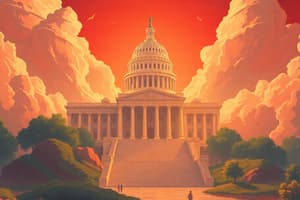Podcast
Questions and Answers
Which term is often used more specifically to refer to the approximately 200 independent national governments and subsidiary organizations?
Which term is often used more specifically to refer to the approximately 200 independent national governments and subsidiary organizations?
- Executive
- Legislature
- Government (correct)
- Judiciary
What are the main types of modern political systems recognized?
What are the main types of modern political systems recognized?
- Monarchies, totalitarian regimes, and democracies
- Authoritarian regimes, democracies, and hybrid regimes (correct)
- Hybrid regimes, monarchies, and totalitarian regimes
- Totalitarian regimes, authoritarian regimes, and monarchies
What is a means by which organizational policies are enforced and a mechanism for determining policy?
What is a means by which organizational policies are enforced and a mechanism for determining policy?
- Government (correct)
- Judiciary
- Legislature
- Executive
What is a statement of governing principles and philosophy that many governments have?
What is a statement of governing principles and philosophy that many governments have?
What are historically prevalent forms of government?
What are historically prevalent forms of government?
Flashcards
Government
Government
Approximately 200 independent national governments and organizations.
Types of political systems
Types of political systems
Categories include authoritarian regimes, democracies, and hybrid regimes.
Constitution
Constitution
A statement of governing principles and philosophy for a government.
Monarchies
Monarchies
Signup and view all the flashcards
Hybrid regimes
Hybrid regimes
Signup and view all the flashcards
Study Notes
Political Entity
- The term "sovereign states" is often used to refer specifically to the approximately 200 independent national governments and their subsidiary organizations.
Modern Political Systems
- Major types of modern political systems include democracy, authoritarianism, totalitarianism, and oligarchy.
- Democracies can be further divided into direct and representative forms, where citizens have varying degrees of participation in governance.
- Authoritarianism typically restricts political pluralism, while totalitarian systems exert complete control over public and private life.
Policy Enforcement
- A means of enforcing policies is through legislative mechanisms, which include established rules, regulations, and laws that dictate organizational behavior and decision-making.
- Policy enforcement mechanisms ensure compliance through monitoring, accountability, and potential sanctions or rewards.
Governing Principles
- A constitution serves as a statement of governing principles and philosophy for many governments, outlining the framework for political processes.
- Constitutions often enshrine fundamental rights, governance structure, and the relationship between the state and its citizens.
Historical Forms of Government
- Historically prevalent forms of government include monarchies (absolute and constitutional), feudal systems, empires, and republics.
- Monarchies often centralize power in a single ruler, while republics emphasize elected representation and accountability to the public.
Studying That Suits You
Use AI to generate personalized quizzes and flashcards to suit your learning preferences.




